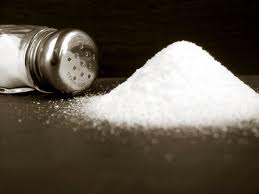
High blood pressure and chronic kidney disease are the two conditions most often associated with high sodium diets. But did you know that conditions like thinning bones and osteoporosis can also be linked to a diet high in sodium? Medical and science communities have speculated for years that excess sodium in the body interferes with our calcium absorption, leading to bone issues and conditions like osteoporosis. There just hasn’t been any proven science to support this generalization. Until now…
Researchers Discover One Molecule Regulates Sodium AND Calcium Absorption
Researchers at the University of Alberta, led by principal investigator Dr. Todd Alexander, have learned that one single molecule in our body regulates both our sodium and calcium absorption – this molecule is the sodium-hydrogen exchanger 3, also known as the NHE3 molecule.
Scientists had previously known that this molecule is responsible for our body’s absorption of sodium. Dr. Alexander had simply wondered if the same molecule could possibly be responsible for calcium absorption as well.
Well… guess who looks super smart now?
Dr. Alexander conducted lab studies on animals known to have no NHE3 molecule in their system. The animals without this particular molecule had much higher levels of calcium in their urine, while also developing the same thinning and brittle bones associated with calcium deficiency in humans.
This research has confirmed that when our body rids itself of excess sodium through our urine, we are also losing calcium as well. The stored calcium in our body is obviously depleted, leading to inadequate calcium levels and conditions like thin bones and osteoporosis.
So What Now?
Pharmaceuticals are already talking about creating medication to target this molecule. But there are two things we can do to help ourselves naturally…
1. WE NEED TO LIMIT OUR SODIUM!
The average American consumes about 3,400 mg of sodium per day. Even those of us who think we have our sodium intake in check probably don’t.
We should all be limiting our sodium intake to less than 2,300 mg a day. This is roughly the equivalent of a teaspoon of table salt.
Anyone 51 years-old or older, along with African Americans, and anyone with chronic high blood pressure, kidney disease, or diabetes should limit sodium intake to 1,500 mg…
Remember that our body NEEDS salt to balance fluids, transmit nerve impulses, and for muscle contraction and relaxing. Never go less than 500 mg of sodium per day.
More people these days may be choosing low sodium options, no longer cooking with salt, and no longer salting the food on our plate, but there is much more to managing sodium intake.
First, it doesn’t have to be a “salty food” to have sodium. A serving size of Greek Yogurt may have 120 mg of sodium. Little things that we eat on the run throughout the day can add up. Be mindful of the sodium content in those “healthy” and “lean” microwavable frozen meals that are way too convenient for lunches at work. Cut down on processed foods like bread, pizza, lunch meat, bacon, cheese, soups, and fast foods. Also be mindful of sodium when going out to eat.
2. CALCIUM SUPPLEMENTATION IS CRITICAL
This study has given us further reason to be concerned about the amount of calcium excreted through urine. This makes calcium supplementation more critical than ever before. When it comes to calcium supplements, the Rag-Tag Research Geeks recommend Calciology™.
Calciology contains Calcium Citramate, which is a safer and much easier absorbed form of calcium, further aiding bone strength and defending against the likelihood of osteoporosis. It is also the only form of calcium that has been clinically proven to reduce the risks of kidney stones, which are also linked to a high sodium diet. Additionally, it contains Lysine which specifically decreases the amount of calcium that we lose in urine. There is simply no safer and more effective way to safeguard your body against the trouble that comes with depleted calcium levels.


Leave a Reply
You must be logged in to post a comment.